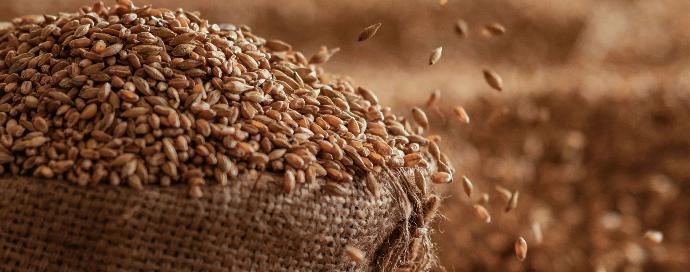Introduction
Looking to improve your health and well-being? Look no further than flaxseed, a powerful food that has been revered for centuries for its many health benefits. Packed with essential nutrients, vitamins, minerals and omega-3 fatty acids, flaxseed is a versatile superfood that can easily be incorporated into your daily diet. Whether it's improving heart health, aiding digestion or improving skin and hair health, flaxseed offers a wide range of benefits that can contribute to your overall wellbeing. Whether you sprinkle them on your morning cereal, mix them into your smoothies or use them to replace eggs in your baking, flaxseeds are a simple and delicious way to optimise your diet. Join us to discover the incredible health benefits of flaxseed and why this little seed should be part of your pantry. Get ready to discover the potential of flaxseed and start on the road to better health and happiness.

Nutritional profile of flaxseed
Flaxseed is a veritable mine of essential nutrients for the body. They are rich in dietary fibre, omega-3 fatty acids, plant proteins and minerals such as magnesium, potassium and copper. What's more, they also contain B vitamins, antioxidants and phytoestrogens, which are plant compounds that are beneficial to our health. These essential nutrients make flaxseed a valuable addition to our daily diet.
The dietary fibre found in flaxseed is beneficial for digestion and helps regulate intestinal transit. They also promote a feeling of satiety, which can be useful for maintaining a healthy weight. Omega-3 fatty acids are essential for heart health and can help reduce inflammation in the body. The plant proteins found in flaxseed are a healthy alternative to animal protein sources and can be beneficial for vegetarians and vegans.
Health benefits of flaxseed
Flaxseed is known for its heart-healthy benefits. The omega-3 fatty acids found in flaxseed can help reduce blood cholesterol levels and prevent cardiovascular disease. They can also help reduce inflammation in the blood vessels and keep blood pressure at a healthy level. By regularly incorporating flaxseed into your diet, you can help maintain a healthy heart.
Flaxseed and digestive health
Flaxseed is excellent for digestive health. Their high dietary fibre content helps to prevent constipation and promote regular bowel movements. The dietary fibre in flaxseed acts as a prebiotic, nourishing the good bacteria in our intestines and promoting healthy intestinal flora. What's more, flaxseed can help reduce the symptoms of irritable bowel syndrome, such as bloating and abdominal pain.
Flaxseed and weight management
If you're looking to maintain a healthy weight or lose weight, flaxseed can be a valuable ally. Their high dietary fibre content promotes satiety, which can help you control your appetite and avoid cravings. What's more, the omega-3 fatty acids found in flaxseed can help regulate fat metabolism and promote fat burning. By including flaxseed in your balanced diet, you can support your weight management goals in a natural and healthy way.
Flaxseed and hormonal balance
Flaxseed contains phytoestrogens, plant compounds that act in a similar way to oestrogens in our bodies. These phytoestrogens can help maintain hormonal balance in women, particularly during the menopause. They can reduce symptoms such as hot flushes, mood swings and sleep disturbances. Flaxseed can also help regulate the menstrual cycle and reduce the symptoms of premenstrual syndrome.
Incorporate flaxseed into your diet
Now that you're convinced of the many benefits of flaxseed, you may be wondering how you can easily incorporate it into your daily diet. Fortunately, there are many delicious ways to eat flaxseed.
One of the easiest ways is to sprinkle them on your morning cereal, yoghurt or salad. Flax seeds add a crunchy texture and a slightly nutty flavour to your dishes. You can also add them to your smoothies for an extra dose of nutrients. Flaxseed can also be used as a substitute for eggs in cooking. By mixing one tablespoon of ground flaxseed with three tablespoons of water, you'll get a healthy, vegan egg substitute.
Flaxseed recipes and cooking tips
Here are some recipe ideas for using flaxseed in your cooking:
1. Flax seed bread: Add ground flax seeds to your homemade bread recipe for a unique texture and flavour.
2. Flaxseed energy bars: Mix flaxseed with dried fruit, nuts and honey to make delicious homemade energy bars.
3. Flax and berry smoothie: Mix flax seeds with berries, yoghurt and a little honey for a healthy, refreshing smoothie.
Feel free to experiment and add flaxseed to your favourite recipes for a touch of extra nutrients.
Buying and storing flaxseed
When you buy flaxseed, make sure you choose high-quality seeds, preferably organic. You can find them in health food shops, health food shops or online. We recommend buying whole flaxseeds and grinding them as needed to preserve their freshness and nutrients.
To preserve flaxseed, place in an airtight container and keep in the fridge. Ground flaxseed will keep for about a month, while whole flaxseed can be stored for up to six months.
Conclusion
Flaxseed is a treasure trove of health benefits. Their nutritional profile is rich in dietary fibre, omega-3 fatty acids, plant proteins and minerals, making them an excellent addition to our daily diet. From heart health benefits to digestion, weight management and hormone balance, flaxseed offers a multitude of benefits for our overall well-being. So don't wait any longer, add flaxseed to your diet and enjoy the many benefits this superfood has to offer. Your health and happiness will thank you.
